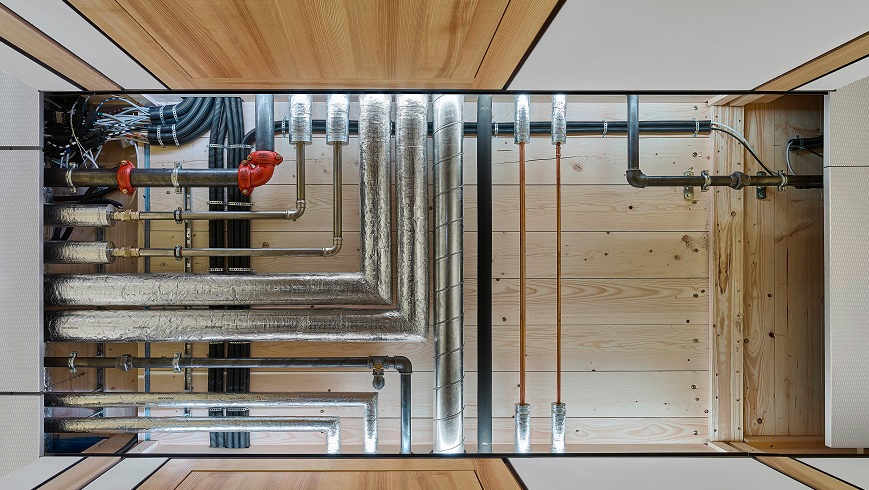Jan 31 2020
Empa researchers believe that buildings can learn to save energy on their own. The researchers performed experiments in which they fed a “smart” self-learning heating control system with temperature data collected from the present weather forecast, as well as from the previous year.
 The “Urban Mining and Recycling” unit in the NEST research building has two student rooms. One of them was equipped with a self-learning heating and cooling control system. Image Credit: Zooey Braun, Stuttgart.
The “Urban Mining and Recycling” unit in the NEST research building has two student rooms. One of them was equipped with a self-learning heating and cooling control system. Image Credit: Zooey Braun, Stuttgart.
The new control system was subsequently able to estimate the behavior of the building and act with excellent anticipation. The outcome was lower energy costs and greater comfort.
Automated “anticipatory” heating systems are usually installed in high-rise office buildings, airport terminals, and factory halls. Such heating systems work with pre-defined stations that were particularly computed for the building and allow building owners to save a lot of heating energy. But an individual programming like that is rather costly for private homes and separate apartments.
In the previous summer, a team of Empa scientists demonstrated for the first time that it can certainly be much easier than that—it is not essentially required to program smart heating and cooling control systems because they can just as easily learn to minimize costs by themselves, based on the information of previous weeks and months.
These systems also remove the need for programming experts. With this ingenious concept, the cost-effective technology will soon be available for both singles and families.
The major experiment was performed in the research building NEST of Empa. The Urban Mining and Recycling (UMAR) unit provides prime conditions for this kind of test—a huge eat-in kitchen is designed on either side of two student rooms. The two rooms measure 18 m2 each and the whole window front faces the east-southeast direction toward the morning sun.
In the UMAR unit, pre-cooled or heated water flows via a stainless steel ceiling cladding and provides the required room temperature. By using the respective positions of the valve, the energy used for heating and cooling purposes can be determined for each individual room.
Clever Cooling—Thanks to the Weather Forecast
Project leader Felix Bünning and his collaborator Benjamin Huber did not prefer to wait for the heating period, and therefore, they initiated a cooling experiment earlier in June 2019. The week from June 20th to 26th started with two sunny yet rather cool days and these were followed by a cloudy day. The Sun finally burned over Dübendorf and increased the external temperature to almost 40 °C.
The temperature in both the sleeping rooms should not go beyond the mark of 25 °C during the day, while the limit is set to 23 °C at night.
While a traditional thermostatic valve ensured cooling in one room, the experimental control system integrated with artificial intelligence (AI), and installed in the other room, was active. This system was developed by Bünning, Huber, and their research team. Integrated with data collected from the past 10 months, the AI was aware of the present weather forecast from MeteoSwiss.
Greater Comfort with Less Energy
The outcome was very clear—the intelligent heating and cooling control system conformed relatively more closely to the predefined comfort specifications and used about 25% less energy. This was mostly because during the morning time, the system was already cooling the room when the sun was entering through the windows.
On the other hand, the traditional thermostat installed in the second room could only respond after the temperature escaped through the ceiling, which was too hectic, too late, and consumed full power.
Earlier in November 2019, which was a cool month with plenty of rain, cool winds, but little sun, Bünning and Huber again performed the experiment. Now, the focus was to heat the two individual rooms. During that time, this problem went to press, the assessment of which is still ongoing. However, Bünning believes that his predictive heating control system also gains points here.
The Empa researchers have already prepared the subsequent step.
In order to test the system in a real-world environment, we have planned a larger field test in a building with 60 apartments. We will equip four of these apartments with our intelligent heating and cooling control system.
Felix Bünning, Project Leader, Empa
Nevertheless, Bünning is curious about the outcomes. “I think that new controllers based on machine learning offer a huge opportunity. With this method we can construct a good, energy-saving retrofit solution for existing heating systems using relatively simple means and the recorded data,” he concluded.
Indoor climate: energy saving thanks to data predictive controller
Video Credit: Empa